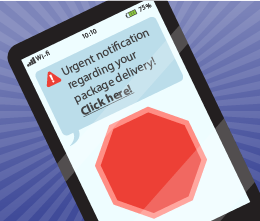https //usps.postreceive.com Smishing Package Tracking Text Scams
https //usps.postreceive.com Smishing Package Tracking Text Scams
The website https://usps.postreceive.com pretends to be USPS in order to obtain your personal information and it is Fake. Their SMS look like they came from the real USPS, but they actually tell you that your item has been delayed and give you a link to a phoney website called Usps.postreceive.
USPS® and the Postal Inspection Service are aware of the circulation of fake emails/email scams claiming to be from USPS officials including the Postmaster General. Please know USPS officials would never reach out directly to consumers and ask for money or Personal Identifying Information (PII). Please read the information below to protect yourself from email scams and other kinds of consumer fraud.
If you ever receive an email about a package delivery or unpaid online postage charges, be careful. Some postal customers are receiving bogus emails featuring the subject line, “Delivery Failure Notification.” These emails appear to be from the U.S. Postal Service® and include language regarding an unsuccessful attempt to deliver a package. The email will prompt you to confirm your personal delivery information by clicking a button or downloading an attachment, that, when opened, can activate a virus and steal information—such as your usernames, passwords, and financial account information. The Postal Inspection Service is working hard to stop these emails and protect your information.
Forward USPS-related spam emails to spam@uspis.gov
If you receive an email about a package delivery failure, forward it to spam@uspis.gov, then delete the email.
Forward Non-USPS spam emails to the Federal Trade Commission at https://reportfraud.ftc.gov/#/
Did you receive an email from the Postal Service about an attempted or intercepted package delivery? DON’T CLICK ON THE LINK! Check out the video for more info on what to do.
Protect Yourself From Email Scams
Do not give out personal information over email
Be aware that the U.S. Postal Service does not notify customers of package delivery attempts, or request personal information, via email.
Poor grammar indicates a fraudulent email
Poor grammar and spelling errors are a good indication that the email is fraudulent.
Be wary of urgent emails
If the email requests “immediate action,” it could be a scam.
Forward spam emails to spam@uspis.gov
If you receive an email about a package delivery failure, forward it to spam@uspis.gov, then delete the email.

When a USPS Text is not a USPS Text
It’s an all-too familiar cycle. New types of communication channels bring new types of deception. Telemarketing brought robocall scams, the growth of email brought about phishing, and now, as more companies communicate with customers through text messages, comes… smishing.
What’s smishing? A fraudulent text message pretending to be from a reputable source – your bank, for example, or the U.S. Postal Service. Usually the message tries to get the target to reveal personal information, such as passwords or credit card numbers, or to convince the recipient to click on a link that installs malware.
During an audit of the Postal Service’s social media activity, the OIG uncovered a smishing campaign which involved a third party posing as USPS, claiming to have a link to information about a package. In our recent Management Alert, Active Smishing Campaign Masquerading as the U.S. Postal Service, OIG auditors examined the Postal Service’s response to the attack.
We reviewed Postal Service social media channels as well as USPS.com and found that at the time the Postal Service had not provided any public notification of this campaign. However, in late October the U.S. Postal Inspection Service rolled out a smishing awareness campaign on its public website.
Alerting customers to potential fraud helps protect their personal information and preserves the Postal Service’s brand, reputation, and customer loyalty.